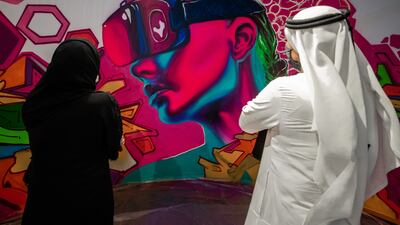As a young girl, a topic that excited my friends and I most was the future. We would talk for hours about our dreams and the careers we aimed to pursue. A doctor engineer, or a pilot were among the most desired career paths among my friends. Back then, fields such as photography, filmmaking and design were viewed as hobbies or side ventures and weren’t widely accepted as career paths.
Fast forward to the present day and there’s never been a greater time for creatives in the UAE. The valuable contribution of the creative economy to the gross domestic product is at the heart of the UAE’s strategies for the future and creatives are encouraged to play a role in the country’s growing sector.
Last April, Dubai launched its Creative Economy Strategy, and the UAE’s 10-year National Strategy for the Cultural and Creative Industries – the first in the Arab World – was announced ahead of the World Conference on Creative Economy (WCCE) 2021, which was organised by the UAE's Ministry of Culture and Youth, and held at Expo 2020 last week.
The creative economy is a collective name given to a number of industries, such as media, publishing, visual arts and crafts, cultural heritage and museums and filmmaking, among others.
I was invited by the UAE's Ministry of Culture and Youth to participate as a speaker at WCCE and to reflect on the challenges and opportunities faced by operators in the creative economy. A shared message among fellow speakers was how important it is to support the creative economy now more than ever – the essential role that businesses can have in helping creatives navigate the economy, and build sustainable businesses.
A 2021 study published by Dubai Culture and Arts Authority revealed that the contribution of the cultural and creative industries to Dubai’s GDP increased from 2.6 per cent in 2018 to 2.7 per cent in 2019. The Dubai Creative Economy Strategy aims to increase the number of cultural and creative institutions to 15,000 by 2026, providing 140,000 jobs in various industry within this.
Nearly 97 per cent of creatives in Dubai are entrepreneurs, said Hala Badri, director general of Dubai Culture and Arts Authority, at WCCE, which indicates the pivotal role entrepreneurs play in the sector.
In the UK, creative industries broke a record in 2017, contributing £101.5 billion ($134.6bn) to the country’s economy. Globally, the creative economy accounts for 3 per cent of the world’s GDP and employs 3 million people.
The role played by businesses is just as essential as governments in helping entrepreneurs in the creative industries to not only launch their start-ups, but to thrive and be sustainable. This role starts with education and knowledge transfer.
Being equipped with the knowledge to operate and thrive in the industry is key to their sustainability. We don’t just want to see more creative entrepreneurs, but we would like to see them manage growing, sustainable businesses. Working with creatives for nearly a decade, I know that simple things such as putting together a portfolio or building a website could enhance creatives’ visibility and attract potential clients.
Businesses and incubators can play a major role in helping equip creatives with the commercial know-how through the provision of mentorships and guidance. This is where governments could partner with business entities and work together on programmes geared towards the development of creatives. Incentives for companies that take part and support the growth of the creative economy could include having certain fees waived and be recognised by the government for their efforts.
This education should also start at a school level, where educational institutions in partnership with businesses could provide workshops and mentorship programmes for students to encourage them to join the creative sector and pursue it as a career.
The creative economy is essential to humanity, as it is the arts and culture that help to inspire great ideas, and give birth to ventures that positively impact our lives. As businesses and entities finalise their plans for next year, I invite them to reflect on the role that they could play with governments to help this sector thrive.
Manar Al Hinai is an award-winning Emirati writer and communications consultant based in Abu Dhabi. Twitter: @manar_alhinai

